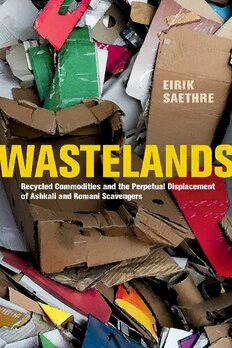
Wastelands: Recycled Commodities and the Perpetual Displacement of Ashkali and Romani Scavengers PDF
Preview Wastelands: Recycled Commodities and the Perpetual Displacement of Ashkali and Romani Scavengers
Wastelands Wastelands recycled commodities and the perpetual displacement of ashkali and romani scavengers Eirik Saethre university of california press University of California Press Oakland, California © 2020 by Eirik Saethre Library of Congress Cataloging-in-Publication Data Names: Saethre, Eirik, author. Title: Wastelands : recycled commodities and the perpetual displacement of Ashkali and Romani Scavengers / Eirik Saethre. Description: Oakland, California : University of California Press, [2020] | Includes bibliographical references and index. Identifiers: lccn 2020017886 (print) | lccn 2020017887 (ebook) | isbn 9780520368491 (hardback) | isbn 9780520368514 (paperback) | isbn 9780520976139 (ebook) Subjects: lcsh: Romanies—Serbia—History. | Refugees—Serbia— Belgrade. | Dumpster diving—Serbia—Belgrade. Classification: lcc dx269 .s24 2020 (print) | lcc dx269 (ebook) | ddce 305.8914/9704971—dc23 LC record available at https://lccn.loc.gov/2020017886 LC ebook record available at https://lccn.loc.gov/2020017887 Manufactured in the United States of America 29 28 27 26 25 24 23 22 21 20 10 9 8 7 6 5 4 3 2 1 Contents Acknowledgments vii Introduction: The Other World 1 1. The Sociality of Exception 35 2. Precarious Domesticity 63 3. Abject Economies 94 4. Constrained Aspirations 125 5. Relocations 158 Conclusion: Jebem Ti Život 188 Notes 201 Bibliography 223 Index 237 Acknowledgments Foremost, I am an extremely grateful for the overwhelming help and patience of Polje’s Ashkali and Romani residents. They invited me into their homes, taught a very awkward American how to scavenge, trusted me with their stories, and never stopped looking after me. I must also thank those individuals who generously supported me and my research in Belgrade. Slobodan Stanković worked tirelessly as my research assistant. His remarkable insights, feedback, and linguistic skills played an enormous role in the success of this project. I could not have done it without him. I must credit Goran Ševo, my longtime friend and fellow Australian National University alum, for first encouraging me to work in Belgrade. Later, he supplied invaluable advice and logistical help, which made this research possible. Bojan Žikić coordinated my time in the Department of Ethnology and Anthropology at the University of Belgrade and commented on an early draft of this book. Our discussions of Serbia and Serbian anthro- pology grounded my thinking and writing. Biljana Sikimić kindly shared her expertise regarding Serbia’s diverse Romani population and introduced me to academic networks in Belgrade. Finally, I must acknowledge the financial assistance of the Fulbright Scholar Program and the support of the United States Embassy in Serbia. vii viii acknowledgments I also received tremendous help from my friends and colleagues in the United States. From the very beginning, Ruth Anderson contributed her boundless encouragement, knowledge, and editing skills. Ian Hancock graciously provided advice prior to my departure for Belgrade and then upon my return. I would also like to thank Carol Silverman and Melissa Caldwell, who offered insightful and valuable comments on the manu- script. At the University of Hawai‘i at Mānoa, I am grateful for the unceas- ing support and guidance of Christine Beaule, Jan Brunson, Alexander Mawyer, and Christian Peterson. Introduction the other world Polje was a space unto itself. An informal Romani settlement on the edge of Belgrade, it was home to approximately two hundred Ashkali and Roma living in small one-room shacks. Piles of trash lined the narrow lane that served as the main thoroughfare. Water was obtained from nearby fire hydrants while electricity was siphoned from streetlights. Completely con- cealed by a series of small berms, Polje was situated between two contrast- ing geographies. On one side, gray concrete high-rise buildings punctuated an urban landscape, and on the other, bucolic green fields stretched to the horizon. If Polje seemed out of place, so too did its inhabitants. Every resi- dent was a migrant, refugee, or displaced person. A site of temporary asy- lum, the settlement was largely divorced from the realm beyond its bor- ders. A teenage resident, Deon, aptly described Polje as “the other world.”1 But the settlement was also an Other world, where the exiled sought to build their lives before they were inevitably dislodged once more. Characterized as unhygienic, a squatter camp, and a slum, Polje was one of an estimated 583 “substandard” Romani settlements that pervaded Serbia.2 Serbs decried the blight caused by these settlements while the government prioritized their destruction. Polje’s residents were continu- ally under threat; their homes would never be secure. In addition, informal 1
